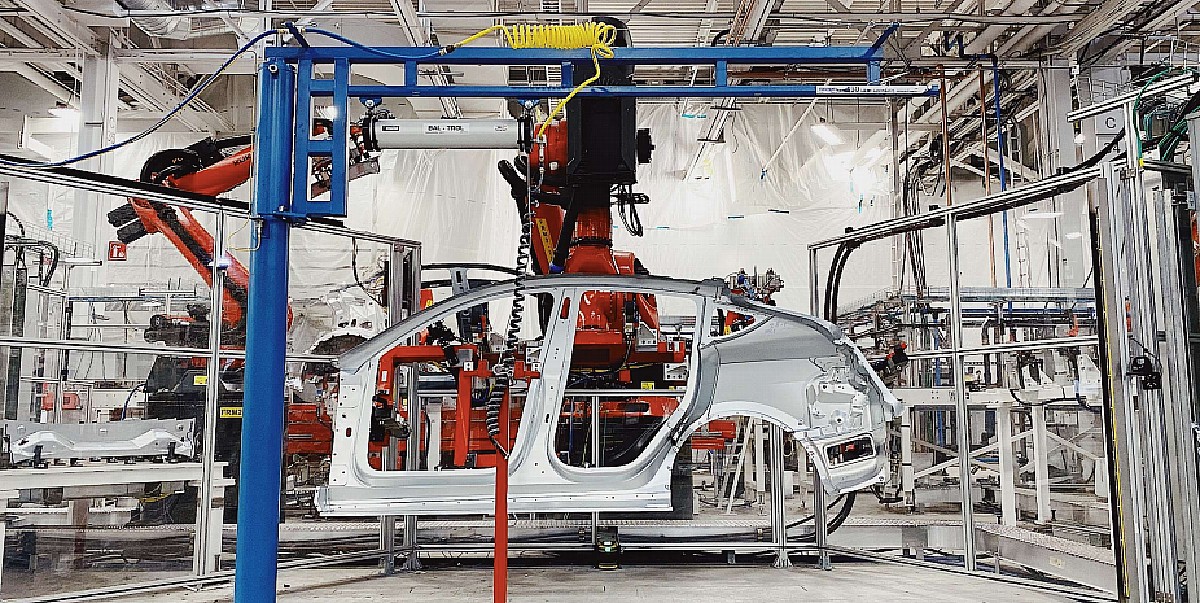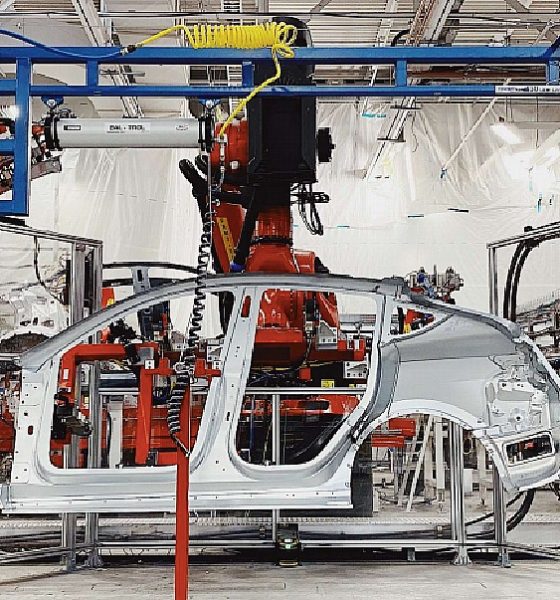

Investor's Corner
‘How did Tesla find chips?’ Morgan Stanley breaks down impressive Q3 delivery performance
Tesla’s impressive third-quarter delivery performance overshadowed the automotive industry’s ongoing struggle with the semiconductor chip shortage. Among all of the world’s automakers, Tesla has been basically the only car company to avert the crisis as it has not had any overwhelmingly public stoppages in vehicle production. Morgan Stanley’s new investor note, drafted by lead analyst Adam Jonas, examines Tesla’s ability to avoid detrimental production stoppages, which effectively helped the company capture its best quarter in company history.
Jonas titles Morgan Stanley’s most recent investor note, “How Did Tesla Find Chips?” In all honesty, this riddle was solved during the Q2 2021 Earnings Call, where Tesla stated in its Shareholder Deck that it used a combination of in-house microcontrollers to avoid any major catastrophes in the manufacturing of its vehicles. The company wrote:
“Our team has demonstrated an unparalleled ability to react quickly and mitigate disruptions to manufacturing caused by semiconductor shortages. Our electrical and firmware engineering teams remain hard at work designing, developing and validating 19 new variants of controllers in response to ongoing semiconductor shortages.”
Jonas broke down Tesla’s ability to break through the parts shortages in four categories: Vertical Integration, Sophistication, Negotiation, and Scale.
Vertical Integration
It is no secret Tesla is amongst the most highly vertically integrated companies in the world, especially in terms of the automotive sector. It controls and maintains many of its own parts, including its vehicle seats. However, the company’s ownership of its retail channel is just a huge advantage in terms of the company’s ability to navigate through the global parts shortages. Customers are not paying astronomical prices for replacement parts, and owners are not tasked with paying increased rates for vehicle service.
Sophistication
Jonas writes that Tesla’s in-house development of its vehicles also comes down to the company’s ability to install the best tech, including processors into its vehicles. Tesla has a reputation for developing the most high-tech vehicles in the market. It’s remarkably true.
Negotiation
While Tesla’s vehicles are amongst the most vertically integrated on the market, the company still maintains relationships with suppliers for the parts it doesn’t make on its own. Its ability to “further in-source technology keeps suppliers on its toes,” while increasing collaboration at a rate that far exceeds other OEMs.
Scale
While Tesla is growing at a very fast rate on a quarter-over-quarter basis, the company is smaller than other OEMs. Jonas writes:
“At the same time, many suppliers believe Tesla is on its way to becoming a dominant OEM with a multiple of the annual volume that it has today. Despite its modest size, most suppliers consider Tesla a ‘strategic’ customer.
Morgan Stanley on Tesla’s 3Q delivery numbers: How did Tesla find chips?$TSLA pic.twitter.com/mOG509HSsW
— David Tayar (@davidtayar5) October 4, 2021
It’s no secret that Tesla’s over 241,000 vehicle deliveries provide an even further bullish outlook on the company’s stock. How it managed to evade the chip shortage comes down to preparation and scalability. While its order forms are not as extensive as other OEMs’, it’s still growing tremendously, outpacing the predictions of even the most robust and informed analysts on Wall Street.
Tesla delivers record 241,300 cars in Q3, handily beating consensus estimates
Disclosure: Joey Klender is a TSLA Shareholder.

Elon Musk
Tesla stock gets latest synopsis from Jim Cramer: ‘It’s actually a robotics company’
“Turns out it’s actually a robotics and Cybercab company, and I want to buy, buy, buy. Yes, Tesla’s the paper that turned into scissors in one session,” Cramer said.

Tesla stock (NASDAQ: TSLA) got its latest synopsis from Wall Street analyst Jim Cramer, who finally realized something that many fans of the company have known all along: it’s not a car company. Instead, it’s a robotics company.
In a recent note that was released after Tesla reported Earnings in late January, Cramer seemed to recognize that the underwhelming financials and overall performance of the automotive division were not representative of the current state of affairs.
Instead, we’re seeing a company transition itself away from its early identity, essentially evolving like a caterpillar into a butterfly.
The narrative of the Earnings Call was simple: We’re not a car company, at least not from a birds-eye view. We’re an AI and Robotics company, and we are transitioning to this quicker than most people realize.
Tesla stock gets another analysis from Jim Cramer, and investors will like it
Tesla’s Q4 Earnings Call featured plenty of analysis from CEO Elon Musk and others, and some of the more minor details of the call were even indicative of a company that is moving toward AI instead of its cars. For example, the Model S and Model X will be no more after Q2, as Musk said that they serve relatively no purpose for the future.
Instead, Tesla is shifting its focus to the vehicles catered for autonomy and its Robotaxi and self-driving efforts.
Cramer recognizes this:
“…we got results from Tesla, which actually beat numbers, but nobody cares about the numbers here, as electric vehicles are the past. And according to CEO Elon Musk, the future of this company comes down to Cybercabs and humanoid robots. Stock fell more than 3% the next day. That may be because their capital expenditures budget was higher than expected, or maybe people wanted more details from the new businesses. At this point, I think Musk acolytes might be more excited about SpaceX, which is planning to come public later this year.”
He continued, highlighting the company’s true transition away from vehicles to its Cybercab, Optimus, and AI ambitions:
“I know it’s hard to believe how quickly this market can change its attitude. Last night, I heard a disastrous car company speak. Turns out it’s actually a robotics and Cybercab company, and I want to buy, buy, buy. Yes, Tesla’s the paper that turned into scissors in one session. I didn’t like it as a car company. Boy, I love it as a Cybercab and humanoid robot juggernaut. Call me a buyer and give me five robots while I’m at it.”
Cramer’s narrative seems to fit that of the most bullish Tesla investors. Anyone who is labeled a “permabull” has been echoing a similar sentiment over the past several years: Tesla is not a car company any longer.
Instead, the true focus is on the future and the potential that AI and Robotics bring to the company. It is truly difficult to put Tesla shares in the same group as companies like Ford, General Motors, and others.
Tesla shares are down less than half a percent at the time of publishing, trading at $423.69.
Elon Musk
Tesla to a $100T market cap? Elon Musk’s response may shock you

There are a lot of Tesla bulls out there who have astronomical expectations for the company, especially as its arm of reach has gone well past automotive and energy and entered artificial intelligence and robotics.
However, some of the most bullish Tesla investors believe the company could become worth $100 trillion, and CEO Elon Musk does not believe that number is completely out of the question, even if it sounds almost ridiculous.
To put that number into perspective, the top ten most valuable companies in the world — NVIDIA, Apple, Alphabet, Microsoft, Amazon, TSMC, Meta, Saudi Aramco, Broadcom, and Tesla — are worth roughly $26 trillion.
Will Tesla join the fold? Predicting a triple merger with SpaceX and xAI
Cathie Wood of ARK Invest believes the number is reasonable considering Tesla’s long-reaching industry ambitions:
“…in the world of AI, what do you have to have to win? You have to have proprietary data, and think about all the proprietary data he has, different kinds of proprietary data. Tesla, the language of the road; Neuralink, multiomics data; nobody else has that data. X, nobody else has that data either. I could see $100 trillion. I think it’s going to happen because of convergence. I think Tesla is the leading candidate [for $100 trillion] for the reason I just said.”
Musk said late last year that all of his companies seem to be “heading toward convergence,” and it’s started to come to fruition. Tesla invested in xAI, as revealed in its Q4 Earnings Shareholder Deck, and SpaceX recently acquired xAI, marking the first step in the potential for a massive umbrella of companies under Musk’s watch.
SpaceX officially acquires xAI, merging rockets with AI expertise
Now that it is happening, it seems Musk is even more enthusiastic about a massive valuation that would swell to nearly four-times the value of the top ten most valuable companies in the world currently, as he said on X, the idea of a $100 trillion valuation is “not impossible.”
It’s not impossible
— Elon Musk (@elonmusk) February 6, 2026
Tesla is not just a car company. With its many projects, including the launch of Robotaxi, the progress of the Optimus robot, and its AI ambitions, it has the potential to continue gaining value at an accelerating rate.
Musk’s comments show his confidence in Tesla’s numerous projects, especially as some begin to mature and some head toward their initial stages.
Elon Musk
Tesla director pay lawsuit sees lawyer fees slashed by $100 million
The ruling leaves the case’s underlying settlement intact while significantly reducing what the plaintiffs’ attorneys will receive.

The Delaware Supreme Court has cut more than $100 million from a legal fee award tied to a shareholder lawsuit challenging compensation paid to Tesla directors between 2017 and 2020.
The ruling leaves the case’s underlying settlement intact while significantly reducing what the plaintiffs’ attorneys will receive.
Delaware Supreme Court trims legal fees
As noted in a Bloomberg Law report, the case targeted pay granted to Tesla directors, including CEO Elon Musk, Oracle founder Larry Ellison, Kimbal Musk, and Rupert Murdoch. The Delaware Chancery Court had awarded $176 million to the plaintiffs. Tesla’s board must also return stock options and forego years worth of pay.
As per Chief Justice Collins J. Seitz Jr. in an opinion for the Delaware Supreme Court’s full five-member panel, however, the decision of the Delaware Chancery Court to award $176 million to a pension fund’s law firm “erred by including in its financial benefit analysis the intrinsic value” of options being returned by Tesla’s board.
The justices then reduced the fee award from $176 million to $70.9 million. “As we measure it, $71 million reflects a reasonable fee for counsel’s efforts and does not result in a windfall,” Chief Justice Seitz wrote.
Other settlement terms still intact
The Supreme Court upheld the settlement itself, which requires Tesla’s board to return stock and options valued at up to $735 million and to forgo three years of additional compensation worth about $184 million.
Tesla argued during oral arguments that a fee award closer to $70 million would be appropriate. Interestingly enough, back in October, Justice Karen L. Valihura noted that the $176 award was $60 million more than the Delaware judiciary’s budget from the previous year. This was quite interesting as the case was “settled midstream.”
The lawsuit was brought by a pension fund on behalf of Tesla shareholders and focused exclusively on director pay during the 2017–2020 period. The case is separate from other high-profile compensation disputes involving Elon Musk.








